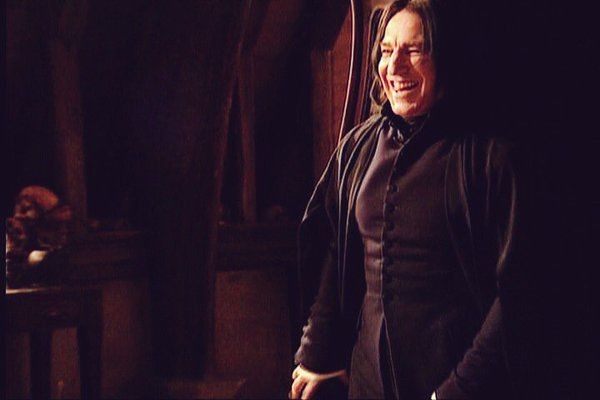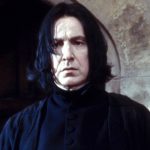The Reluctant Villain
By Zelda Cunningham | Apr 28 2009
Zelda Cunningham speaks to legendary actor, Alan Rickman about Severus Snape, Sense and Sensibility and great big smoking caterpillars.
“WHERE ARE YOU getting this from? I have been acting for 35 years and those five or six roles make such a small part of my career!” Alan Rickman reposts a question about his penchant for playing so many villains. While it is true that after exiting the Royal Academy of Dramatic Art (RADA), Rickman has acted in a variety of roles from Shakespeare’s Tibalt to Colonel Brandon in Sense and Sensibility, his more sinister portrayals seem to burn their way into audience’s memories. And sitting in front of a mass of students in Theatre P in the Newman Building, there is a distinct air of Severus Snape in Rickman’s demeanour.
He is restrained, almost hesitant and his trademark deep voice is slow and pounding and slightly unnerving while answering questions. As with his onscreen persona, Rickman possesses a refined sophistication – his manner of speaking is eloquent, almost poetic and is interspersed with a wry wit which ignites the fixated audience into intermitted bouts of uproarious laughter. When Otwo meets the actor in the, admittedly fitting surrounds of the darkened Arts Block ‘exit’ corridors, Rickman is keen to point out that his acting résumé far exceeds the remit of a suave arrogance of Hans Gruber or the devious Sheriff of Nottingham.
“When selecting roles, you just try and do what you didn’t just do.”
It seems to be with this mantra in tow that Rickman chose his next role – a caterpillar. Rickman explains that he has joined the macabre circus that is Tim Burton’s distorted adaptation of Lewis Carroll’s fantastical tale, Alice in Wonderland, having worked with the eccentric director in the grisly musical, Sweeney Todd: the Demon Barber of Fleet Street. Rickman explains that, as seems to be the norm with Burton, production for this work is nothing short of surreal.
“Well, I believe what is going to happen is it will be my head on an animated caterpillar. I mean, Tim Burton just has a mind like a fairground. I aim to do everything he ever does. I am a crawling sycophant to him!”
Alice in Wonderland is set to be released in 2010, but Rickman relays the difficulties of working on a child’s film by saying, “Well, we’re fighting with Disney at the moment… They are worried about having a character [the caterpillar] that smokes,” he adds, dramatically rolling his eyes to heaven. From the surreal to biographical depictions, Rickman is versed (and critically lauded) for his metamorphosis and cohesion when he takes on a role. However, with certain roles, Rickman discovered that treading carefully is necessary to avoid unwanted controversy.In discussing Neil Jordan’s controversial Michael Collins, Rickman confirms that despite malaise about the film’s depiction of Eamonn DeValera, he had no intention of rendering him the villain that many argue he was seen as. Rickman, whose father is Irish, recalls during a read through of the script, Jordan approached him and inquired, ‘do you hate him [DeValera] yet?’ Rickman denies that he chose to play the former-Taoiseach and president in a negative light and counteracts criticisms that DeValera was portrayed as being linked to Collins’ assassination.“Of course with roles like that, there is a certain delicacy you must apply, but I don’t think that the film indicated that DeValera had any influence in Collins’ death.” Historical adaptations will undoubtedly be problematic for any actor, but trying to immerse oneself in a role that millions of people know and love (or indeed hate) is even more perilous.
“I like limitations. They are good for a role. They help apply imagination to the story, like with my rubber head in Galaxy Quest”
When it was decided to adapt the Harry Potter books onto the silver screen, the author of the works, J. K. Rowling reportedly was adamant that Rickman played the sinister Severus Snape, the seeming nemesis of the hero wizard, Harry Potter. However despite the author’s support, Rickman explains that he was somewhat dubious about taking on a character with such a weighted fan-base.“I said to Jo Rowling, ‘Look, I can’t play him unless I know him’. She then gave me this elliptical piece of information that I didn’t really understand at first. It was information she hadn’t told anyone else, not even her sister, but it gave me what I needed to take on Snape.”Despite obtaining much the much coveted ‘inside scoop’, his interpretation of character so renowned could have been very ill-received. Thankfully, this was not the case and fans of the books have intertwined the cinematic and literary versions of Severus Snape into one being. Another work which Rickman was apprehensive about taking on was in his role as the dignified, noble Colonel Brandon in adaptation of Jane Austen’s Sense and Sensibility.“I was very wary about it. I happen to love Jane Austen. When I first read her work, it was that type of moment where you wanted to show it to people and tell them how beautiful it is,” he explains.
“It was challenging, especially with the period clothes. You have to wear them for weeks, just practising how to walk and bow… and learning how to go to the bathroom. But I like limitations. They are good for a role. They help apply imagination to the story,” Rickman continues, before drolly adding, “Like with my rubber head in Galaxy Quest.”
Unlike many actors of such a profile, Rickman has managed to leave the theatrics and drama on the film side and has retained a relatively private life beyond the limelight. Until Otwo almost trampled his wife in said blackened hallway, I was unsure if Rickman was even married. However, being the face of the most famous film saga does tend to attract some attention, yet nothing compared to that of other celebrities.“Fame is all relative. I mean, when you are with Johnny Depp (who Rickman starred with in Sweeney Todd and in the upcoming Alice and Wonderland), you realise ‘I’ve nothing to worry about,” he says, “I mean, sometimes I even fly economy!”“When you live in London, as I do, being famous isn’t really a problem. People just stare at the pavement so they don’t really come up to you. In New York, weirdly, there is no class system. People just walk past you and say ‘like your work’, directly and honestly and walk on. But it difficult being famous and when you’re English. There is an idea that you have to get back in your little bus. ‘Get back in your box’ should be the national emblem.”And nothing puts you ‘back in your box’ like negative critical reaction to your work. Although it is impossible to ignore the reflection of a mirror held up to an actor as an artist, Rickman remains unaffected by reviews.
“I remember reading a review of saying that I had a voice that sounded like it came out of the backend of a drainpipe. There is always going to be someone who hated you in print. You just cannot let it affect you,” says Rickman.
Inevitably, with any art form, the worst criticisms are often self-inflicted. Rickman admits that he is his own harshest critic and therefore cannot bring himself to watch his own work.“I never watch [my films]. Genuinely, I’m not just saying it. All I can see is my mistakes. In theatre, I can’t watch myself or be objective, so it suits me better in some ways.”
Having commenced his career in theatres, Rickman has an enduring affinity for the stage. He expresses an interest in focusing more on this side of acting and directing in the future.In 2005, Rickman directed the critically acclaimed My Name Is Rachel Corrie, a play bases on the diaries of a 23-year-old American woman who died after being hit by an Israeli bulldozer. The play debuted at the Royal Court Theatre, London, where Rickman was honoured with by audiences who gave him the Theatre Goers’ Choice Awards for best director. His enthusiasm for more unusual roles on screen (Dogma, Galaxy Quest and indeed Alice and Wonderland), seems to also translate itself to theatre roles.“I love new writing. I love seeing what’s going on in a writers head and you go, ‘Where the hell did that come from?!” Rickman says excitedly. For an actor who was accused of being typecast as a villain, on closer reflection Rickman is a paradox of stability yet versatility. Despite being at retirement age, it seems clear that he has no intention of limiting his theatrical scope. When Otwo asks the actor if, after 35-years, he grows weary of the centre stage he replies,
“No, life has shifting horizons so you might as well keep swimming.”
Alan Rickman received the Literary and Historical Society’s (L&H) James Joyce Award



